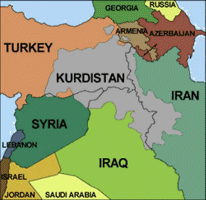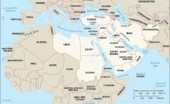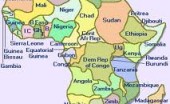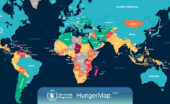Re Ian Bremmer 'Could third-party candidates upend the 2024 US election?' 3 April The current political movement in the USA…
Wednesday Night #1373
Written by Diana Thebaud Nicholson // June 25, 2008 // Herb Bercovitz, Reports, Wednesday Nights, Wednesday Nights Meta // 3 Comments
More on www.wednesday-night.com with link to photos
Happy Fête nationale to one and all!
This week we are very pleased that Guillaume Lavoie, Sauvé Scholar alumnus, a seasoned international observer and consultant in government relations has offered to come to Wednesday Night to discuss his recent trip to Iraq, and more particularly, Iraqi Kurdistan.
He “got to travel to all parts of the region and met with just about every stakeholder, from the common man on the street to a private meeting with the President! Iraqi Kurdistan is a most fascinating political, economic and social reality, to say nothing of the history-rich background of a people that has been the victim of systematic torture, discrimination, violence and even genocide. On top of it all, Iraqi Kurdistan is most likely one focal point of very high level geo-political interests, games and bargains of the US, Turkey, Iraq, Iran, Syria, Israel and more (plus, it is absolutely beautiful!) ”
* Guillaume is currently establishing Mission Leadership Québec, an initiative that creates networking and strategic positioning opportunities for young Québec leaders and their organizations who want to be active beyond Québec’s borders. He hopes to establish a permanent office and do 5 to 10 missions per year. Coming missions are Alberta (Fall 2008) and Salvador (March 2009).
Fondée en 2005, Mission Leadership Québec est un organisme sans but lucratif et non partisan qui a pour mission d’être le véhicule de réseautage et de positionnement stratégique par excellence des jeunes leaders québécois et de leurs organisations, auprès des dirigeants actuels et futurs des régions et lieux d’influence à l’extérieur des frontières du Québec.
L’initiative vise à renforcer les capacités des leaders de la génération montante dans le contexte d’un monde de plus en plus globalisé, où la compréhension des enjeux internationaux, l’acquisition d’une crédibilité professionnelle reconnue à l’étranger et les réseaux personnels entre les décideurs sont essentiels à la réussite du Québec, ici et par delà ses frontières.
En 2008, Mission Leadership Québec a été honoré par la Jeune chambre de commerce de Montréal comme l’une des organisations finalistes au Concours provincial ARISTA.
The happy coincidence of Guillaume’s topic with the Talisman announcement and the report of the British parliamentary group (below) ensures that Wednesday Night remains up-to-the-minute with its subject matter.
There are of course other events to which we draw your attention, including:
the continuing sorry saga of Zimbabwe;
the acrimonious debate over Stéphane Dion’s carbon tax proposal – how many noted Don Drummond’s endorsement? -;
the economy;
the impressive turnaround in the standing of the PLQ, acknowledged by none other than Josée Legault;
John McCain’s speech in Ottawa that was avoided by most members of the Government;
and other items linked below.
There’s never been a Wednesday Night when we have lacked for intellectual fodder and this will not set a precedent in that respect.
Follow the links and you’ll follow the conversation!
Talisman says Kurdistan has potential to be core production area
CALGARY — Talisman Energy Inc.announced a deal with the Kurdistan Regional Government to buy a stake in two oil exploration blocks. Reuters
Iraq: Oil Contracts and the Security Environment
Iraq’s Oil Ministry on April 14 published a list of companies that qualified to bid in the first licensing round for oil and gas contracts. Absent were companies that have signed deals with the Kurdistan Regional Government. [more]
British parliamentary group calls for UK to support Kurdistan Region as model for Iraq
Possible Deal on Kirkuk Could Be a Stabiliser
Background on Kurds and Nigeria oil pipeline ‘attacked’
The loss could equate to about 120,000 barrels per day, about 6.6% of Nigeria’s total daily crude production. Earlier this week, Nigeria’s president ordered tighter security in the Delta after an attack at a Shell facility.
Gulf Eyes “Oil-For-Food” Deal With Neighbours
DUBAI – Recent attempts by Gulf countries to invest in farmlands abroad to counter soaring inflation and guarantee long-term food security could prove to be a win-win situation in the short-term for both the oil-rich region and its investment-hungry neighbours, but continued high oil prices may neutralise the gains in the long-run, feel experts.
EU approves illegal migrants plan – the reaction from Latin America reported by the BBC somewhat surprised us as we think of Latino illegals as heading north, not across the Atlantic. The story is the same, however “Hundreds of thousands of Latin Americans live and work in Europe, many of them without permission. Many do jobs that Europeans do not want to do, providing a vital source of income for poor families back home.” [see comment 2 below]
The Report
Starting the evening on a light note, Judith Patterson presented Diana with a unique-in-Canada gift: an Obama in’08 bumper sticker, obtained with great effort (stealth?) from Florida.
The Jonas/Higgins family contributed bench strength of which Stephen Harper would be jealous in selecting a cabinet: Holly’s brother Benjamin (Benjie), his daughter Kellina and, on her first visit, Kayla, daughter of Holly and Benjie’s “New York brother”. Kayla is a scholarship political science and economics student at the University of Chicago and, fittingly, an Obama volunteer on the executive of Students for Obama.

The Kurds & Iraqi Kurdistan
Guillaume was invited to Iraqi Kurdistan by a young Kurd who, like Guillaume, believes that strategic positioning starts with “brand building” among young leaders. The 10-day mission included young leaders from Britain, Canada and the U.S.
After the collapse of the Ottoman Empire, the Allies agreed and planned to create several countries within its former boundaries. Originally Kurdistan was to be one of them, according to the never-ratified Treaty of Sèvres. Instead, Atatürk took the eastern part of the proposed new country and assimilated it into Turkey.
Today, the Kurdish nation (Greater Kurdistan) is spread mostly over Eastern Turkey, home to some (no current census figures exist) 20 million Kurds, with 8 million in northwest Iran, 4-6 million in Iraqi Kurdistan and 2 – 2.5 million in Syria.
Kurds are distinct ethnically from the inhabitants of other Muslim territories; they are not Arabs, and their language, Kurdish, belongs to the family of Iranian languages, such as Persian and Pashto. One is a Kurd because of blood, not nationality. In this – and many other ways – there are fascinating parallels with Israel, not the least of which is the ambition to establish the one safe haven in the world for Kurds with a secular government committed to the advancement of women.
Outside Iraqi Kurdistan, the Kurds represent significant minorities who have been either oppressed or uneasily assimilated. Inhabitants of semi-autonomous Iraqi Kurdistan are mostly secular, ethnic Kurds consisting mostly of non-Arab Muslims, some Jews and Christians. They do not follow Sharia law. Iraqi Kurdistan boasts of eight Universities. Kurdish, not Arabic, is the first language and English the second.
Throughout the Iraqi war, it has been safe and peaceful with its own stable political structure well trained police force and army, most of their equipment of Soviet and, more recently, U.S. origin.
The Americans are seen as liberators, however having been betrayed, murdered, tortured over the centuries, Kurds remain pragmatic but cautious over their choice of friends and protectors.
The Kurdistan Workers party of Turkey (PKK) has been waging war against Turkey in the attempt to re-establish a greater Kurdistan, but as the Iraqi Kurds reject violence, they reject the PKK as well. Turkey, whose Kurdish population represents 20% of the population and territory, regards the establishment of a sovereign Iraqi Kurdistan as a threat to its internal security and in such an event would almost certainly invade Iraqi Kurdistan bringing them head to head with the U.S., an unlikely and unwanted event for both countries.
Complicating the issue with Turkey is the city of Kirkuk, that is located some 30km outside the border of Iraqi Kurdistan but is the core of a symbolic representation of Kurdistan, and is awash in both oil and water. A referendum has been planned to either integrate it into Iraqi Kurdistan or set up a special status, but has been postponed indefinitely because of the geopolitical implications. (background on Kirkuk’s importance)
The future of Iraqi Kurdistan for the foreseeable future is most likely to be within the Iraqi Federation with sufficient guarantees of autonomy – an independent Kurdistan has too many implications for the security of the surrounding nations.
Foreign interests are flocking to do business with the semi-autonomous region, believing it to be the most secure and reliable gateway to Iraq, but none of the parties would be willing to endorse independence, especially given the land-locked position of the region and the inevitable threat to shipment of its oil. With the opening of Iraqi oil contracts by the Iraqi Oil Ministry, the question of redistribution of regional revenues becomes a key part of Iraqi Kurdistan strategy, which explains the direct deal with Talisman.
[Oil is Iraq’s lifeblood, but it is concentrated in the Kurdish-dominated North and the Shiite-dominated South, leaving the country’s Sunni population with the scraps. Add in export routes that involve Saudi Arabia, Syria, Turkey and Iran, and the country’s oil complex becomes among the most complicated — yet promising — in the world. Iraq’s oil]
There is considerable conjecture that even larger oil fields are to be found in the western part of Iraq, in the desert beyond Fallujah and closer to Syria.
As Stratfor recently pointed out, “The bombing in a Baghdad market really drove home how few there are. So did indications that Iraq is going to open the oil fields to investment. We need to review the status of the war carefully. Our perception has been that the war is winding down and the general outlines of the resolution are in place.” Largely unreported in the media, violence in Iraq has diminished by eighty percent with Sunni particularly tiring of the violence. The small U.S. presence in Iraqi Kurdistan today though largely symbolic is important. When, ultimately, the United States is able to withdraw from Iraq, it appears reasonable that they would leave a sizeable presence as a guarantor of the peace and that such a base would be in Iraqi Kurdistan where the money they would spend and security they would supply would be welcomed.
No-one believes that the 2008 election in the U.S. will result in a total withdrawal of the U.S. military, but rather that there will be major changes in where it is and what it does, i.e., it could withdraw from all policing efforts and/or withdraw from southern Iraq. Curiously, the divide over the two presidential candidates is almost identical to that in the U.S. with the older generation of Kurds supporting John McCain and the younger Kurds supporting Obama.
The U.S. election campaign
The U.S. election campaign continues to fascinate, especially the use of text messaging, YouTube and other internet-based strategies to convey candidates’ messages, stimulate attendance at events and raise funds (Internet-based PAC driving Democratic push)
Media coverage emphasizes the funds donated to the presidential candidates’ campaigns, but rarely reports on the fund raising by the national parties. The Republican National Party is much better funded than is the Democratic Party which, once the nominations are official will change the ratio between the parties’ war chests.
Back in January, there were a number of advocates of a Hilary-Obama dream ticket. Today, the reverse positioning is not so popular, largely because of Bill Clinton, who ever since the South Carolina primary has been increasingly regarded as a liability. Given his constant travels and speeches around the world, as spouse of the vice president, he would be unpredictable, uncontrollable, and could well become an embarrassment to the presidency. Thus it is he rather than Hilary who will likely be the deciding factor in Senator Obama’s anticipated decision to name anyone but Hilary as his running mate.
Some of the older and rank-and-file Democrats and angry, disappointed women voters supporting Hilary, are threatening to vote for John McCain, but most informed commentators believe that once they consider what a McCain presidency would mean regarding abortion and Supreme Court composition, most will fall into line.
Outside the U.S., people believe that Barack Obama has the intellectual capacity to look at issues without being influenced by pressure groups and make decisions based on good judgment.
Once again, it was noted that the American electoral system has a great advantage over the Canadian one in giving voters the opportunity to vote for candidates from different parties in Presidential, Senate Congressional and gubernatorial elections (splitting tickets), which encourages public policy more representative of the will of the majority of citizens.
Mad Max Bernier (cont’d)
Mr. Bernier’s speech to his constituents elicited the usual split opinion among Wednesday Nighters , with some expressing the belief that the missing briefing notes were of minor importance other than to provide the Prime Minister an excuse for taking action against the Minister following his gaffes relating to Haiti, Afghanistan and Burma.




3 Comments on "Wednesday Night #1373"
As for ‘your’ fete national I’ll have you know that I’m on the Saint John
River, “discovered” by Sieur de Monts and Sam. Champlain on 24 June 1604 —
but we don’t have a holiday. Oddly, the natives had discovered the river
long ere that visit but don’t get the credit (despite their village at the
mouth and others up river). Incidentally the expedition was that of de
Monts; Champlain was navigator/geographer/self-aggrandizer. Both, I believe,
were protestants, something lost on early generations of Québécois!
Love, David
Mercosur nations condemn EU plan
Leaders from Argentina, Bolivia, Brazil, Chile, Paraguay, Uruguay and Venezuela — as well as ministers from Colombia, Ecuador and Peru — condemned in strong terms sharp new immigration laws adopted by the EU. “Shameful,” “outrageous,” and “ignominious” were words used by the Mercosur conference attendee nations to describe the EU law, under which illegal immigrants would face up to 18 months detainment and a five-year ban on re-entry. BBC (7/2)
An unconventional holiday in “The Other Iraq” supports and elaborates on many of the points raised about Kurdistan. The Economist